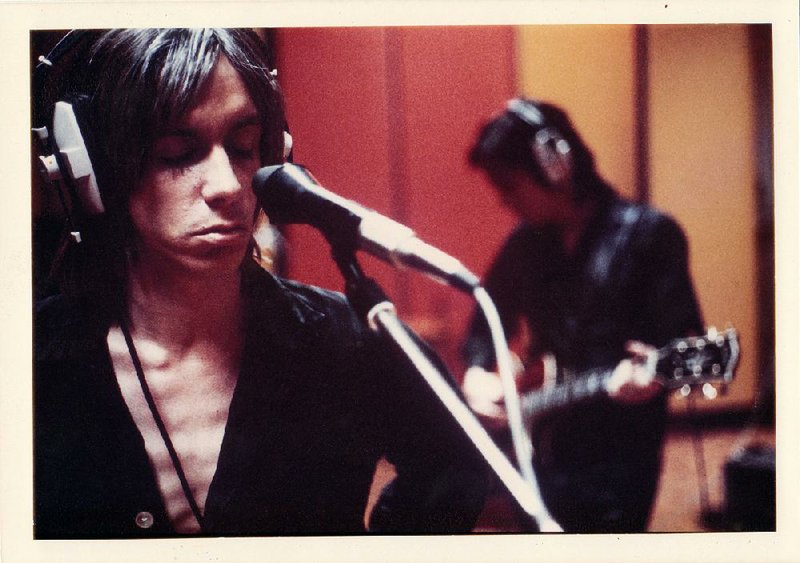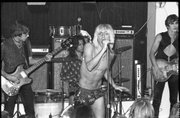The cornerstone of Jim Jarmusch's entertaining rock 'n' roll documentary Gimme Danger is an interview -- obviously conducted over days and weeks in several locations -- with an articulate older gentleman named Jim Osterberg, who remembers growing up "at close quarters in a simple environment" with his parents, who lived in what some sensitive types might call a mobile home, but an unembarrassed Osterberg calls "a trailer."
Osterberg says he was actually proud of that trailer, for it was exactly like the one that Lucille Ball and Desi Arnaz hauled across the country in the 1954 film The Long, Long Trailer. He remembers he had a very small room in that trailer, but that his parents eventually ceded the master bedroom to him so he could set up his drums. In retrospect he realizes that this was really their way of reclaiming their living room, where little Jimmy bashed away on those drums for hours.
Gimme Danger
88 Cast: Documentary, with Iggy Pop, Scott Asheton, Ron Asheton, James Williamson, Danny Fields, Steve Mackay, Mike Watt
Director: Jim Jarmusch
Rating: R, for drug content and language
Running time: 1 hour, 48 minutes
But aside from a couple of these anecdotes, we learn very little about Osterberg's remarkably supportive parents -- and, when you think about it, remarkably little about Osterberg himself. We do learn quite a bit about Osterberg's alter-ego, the proto-punk rock star Iggy Pop, and his most important band, the Stooges, that Jarmusch considers the world's greatest rock 'n' roll band.
Depending on how you define the terms, Jarmusch might be right about that, for the Stooges are in many ways a distillation of what rock 'n' roll -- as opposed to commodified and corporatized "rock" -- is supposed to be about. They were loud, fast and mostly out of control. They started out barely able to play their instruments. They came from blue collar, poor backgrounds and they identified with a naive communism. And, as Iggy Pop once said to Dinah Shore, they helped kill the '60s.
If you are a Stooges fan, you probably know everything Gimme Danger is going to tell you, but you will relish the interviews and the archival footage of the band. If you are not a Stooges fan but interested in the way pop music evolved in the late '60s and early '70s, if you've ever wondered exactly how Elvis collapsed into the Dead Boys, then you are likely to be deeply fascinated by the film, even if, like one notable record executive, you "don't hear a thing" in the Stooges' music.
On the other hand, if you approach the film as a cinema buff, or as a fan of Jarmusch's more outre work -- feature films like Down by Law, Mystery Train, Broken Flowers and Only Lovers Left Alive -- you might come away from the movie feeling a little baffled by the director's failure to impose much of a sense of visual style on the proceedings. This is a professionally realized, competently marshaled movie -- a very responsible treatment of the material. It's not an impressionistic tour de force. And while it acknowledges the attendant sex and drugs, it almost primarily focuses on the rock 'n' roll. Some people might hold that against it.
But I like the restraint, and the fact that Jarmusch doesn't feel compelled to belabor the image we already know, of the stage-diving, peanut-butter-on-chest-smearing Iggy, the transgressive front man who at times seemed determined to do himself harm (presaging the tragic GG Allin), but instead mounts a credible Behind the Music-style look at the rise, disintegration and 21st-century "reunification" of the Stooges.
To this end he uses interviews with other members of the band, including guitarist (and later bassist) Ron Asheton, who died in 2009, and more extensively with his drummer brother Scott, who died in 2014. (Original Stooges bassist Dave Alexander, who was kicked out of the band in 1970 for showing up at a gig too drunk to play his instrument, died in 1975.) James Williamson, who took over guitar duties for the band's third album, Raw Power (which was co-produced by David Bowie and credited to "Iggy & the Stooges" because while it was supposed to be a solo record, he managed to bring his friends over for the sessions) is, aside from Iggy himself, the most articulate and insightful talking head. (And Williamson's post-Stooges career might be worth its own documentary.)
We also hear from punk rock progenitor and impressario Danny Fields, who signed the Stooges to Elektra records and managed them for a time, and saxophonist (and nondrummer) Steve Mackay who joined the band for the second album, Fun House, and Minuteman bassist Mike Watt who filled out the reunited Stooges. Mostly they say expected things, leaving the only revelations to Iggy, who raps mostly in a feral growl that proves surprisingly supple when he mimics other voices and noises. (Those who dismiss the Stooges as clumsy noise-makers might be surprised at the way he seems to ooze musicality.)
He's also a pretty good critic -- one of the best summations of the Stooges comes via an archival clip of Iggy reminding folks his art is "Dionysiac, not Apollonian."
The pre-Iggy Osterman was fascinated by the weird, beautiful music of Harry Partch, who made his own instruments and was influenced by the sound of Howdy Doody's peanut gallery and Soupy Sales' admonition that any letters kids sent to him should be 25 words or less. This was something he took to heart -- he couldn't, and didn't want to, be Bob Dylan, but he could communicate the primal stirrings of the teenage Id.
And while he confesses to acts of debauchery, Jarmusch never sensationalizes it, or treats it as more important than the music. And Osterberg/Pop emerges as a figure of tremendous dignity, as a man who's both proud and cognizant of his place in the culture, and who understands that he's all along been driven by the need to get back at the cool kids who mocked his father's Cadillac and shook his trailer to see if they could unmoor it.
They couldn't. All they did was harden a young man's resolve.
"Ever since," the self-created Iggy Pop says, he has "been out to get 'em."
Gimme Danger is playing Nov. 7 at the Ron Robinson Theater, 1 Pulaski Way, inside the Arcade Building across from Ottenheimer Hall in Little Rock's River Market. Tickets are $5.
MovieStyle on 11/04/2016

